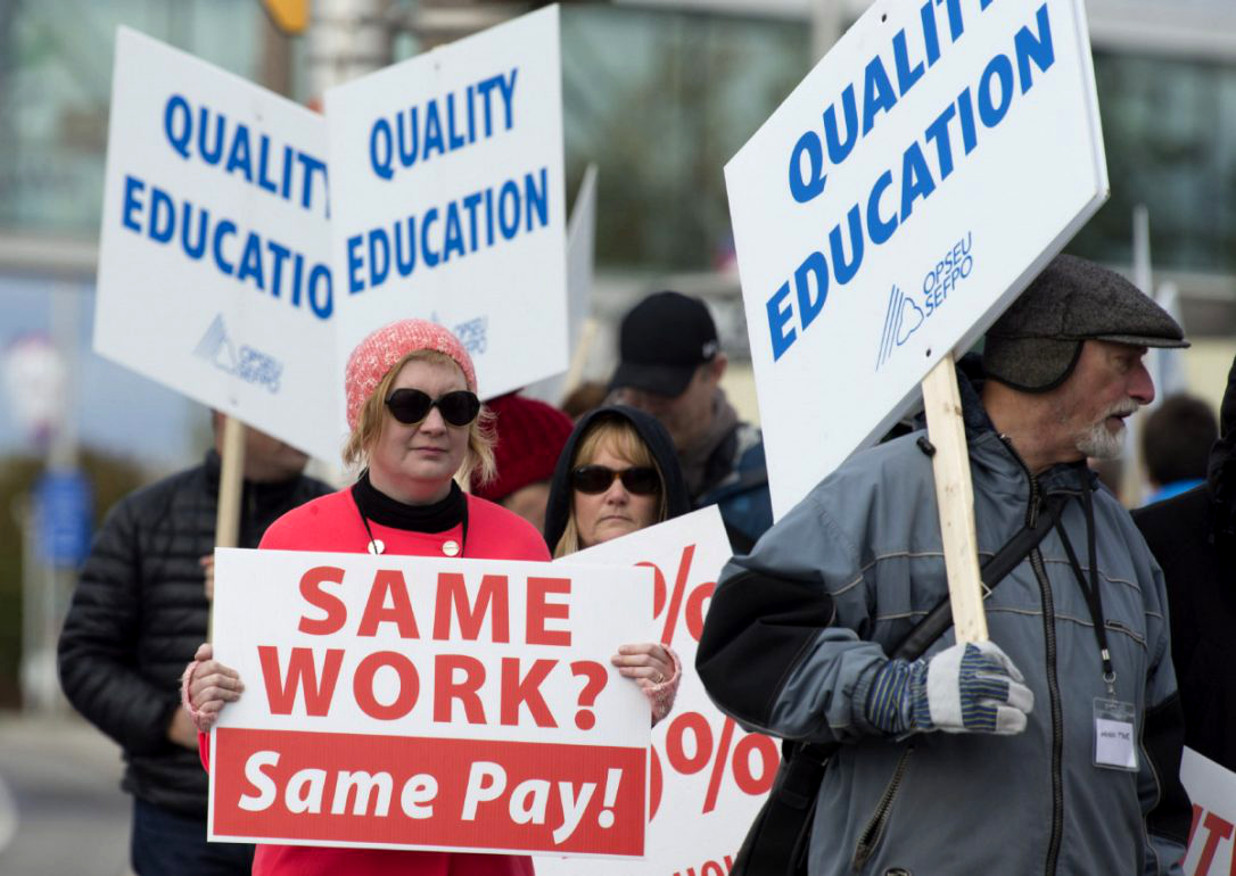Dennis Bayazitov | Assistant News Editor
Featured image: Twelve thousand OPSEU staff members went on strike Monday morning all across Ontario. | Courtesy of Toronto Star
On Monday morning, 12,000 Ontario college faculty, professors, librarians, and counsellors from the 24 colleges across the province went on strike.
Barbara Joy, chief spokesperson and director with York’s Media Relations, says: “We have asked students who are enrolled in a joint or collaborative program with an Ontario college to please contact their specific program office for details.”
The two major issues that are at stake are fairness for academic faculty and academic freedom for college contract employees.
All 24 colleges are organized under the Ontario Public Service Employees Union’s (OPSEU) Colleges of Applied Arts and Technology unit for academic staff.
“In our industry, 81 per cent of staff is made up of contract employees,” says Anna Ainsworth, professor at the School of English and Liberal Studies with Seneca at York. “We think that is an abysmal number which has to change. We are fighting for a better Ontario for all.”
Ainsworth is an OPSEU local steward, and was among the picketers on Pond Road on Monday.
“Ideally, the number we’d like to reach is zero per cent. What we are proposing, however, is 50 per cent, for both full-time and part-time.”
“The biggest issue is academic freedom, which allows the faculty to have full say over the content of the courses and how they are delivered,” says Eden Burton, a Seneca faculty member in Computer Studies, who picketed on Monday.
U of T Women and Gender Studies alumna, and Canadian Federation of Students Treasurer, Trina James, was also present in support of OPSEU.
“It’s interesting when we reflect on fair and secure job wages—if students are attending a post-secondary institution with the expectation that one day, they will all be getting secure jobs—if the people who are teaching them do not have job security—then what does that really say about our system?” she says.
“College professors do not presently have control over their curriculum,” Ainsworth adds.
Managers and supervisors determine what is taught, how grades are assigned, whether courses are taught online or in-class, as well as other academic factors.
“We, as the professors, are both the experts on our field and in our classroom. We believe that we and our students should be the ones determining what is happening in our classrooms—not managers who are not participants.”
On Monday, the Canadian Union of Public Employees (CUPE 3903), also hosted a barbecue by the fountain in front of Vari Hall.
“CUPE 3903 had planned this barbeque for a while to discuss our own bargaining, which is still in its early stages,” clarifies CUPE 3903 Communications Officer Maija Duncan. “It just so happens that OPSEU College Faculty went out on strike the same day.”
Kevin Burris, a York History PhD student and member of CUPE 3903, was one of the student representative informing students about the collective bargaining process.
“We find that, in the past, something that has helped prevent strikes—which is something we know intimately well here at York—is to have an engaged membership, and an especially motivated undergraduate cohort,” he says.
“If undergraduates are aware of what’s going on, keep themselves up-to-date on the issues, and don’t buy into the employer rhetoric of ‘they just want a raise,’ then we avoid a strike, and are able to come to more reasonable accommodations at the bargaining table.”
“OPSEU and CUPE 3903 are in very different stages of bargaining,” Duncan adds. “CUPE 3903 just exchanged proposals with York on Monday. Therefore, it’s a bit too early to speak of ‘demands.’ We have tabled proposals to ensure job security for contract faculty, stable funding for graduate students, as well as a number of equity proposals. The key proposals will become clearer as bargaining develops.
“We fully agree with OPSEU that job security is an essential part of quality education, and support their strike,” she adds.
“The quality of education for students is negatively impacted, as educational institutions increasingly rely on precariously employed contract faculty.”
“I can say that the collective bargaining process is now underway,” Joy affirms.
“We believe that an agreement can be reached without any disruption to the school year, and we are fully committed to doing this.”
“To avoid a strike, York is always prepared to have outstanding issues decided by an independent arbitrator who can make binding decisions on both parties. York is also prepared to use a mediator to assist in resolving outstanding negotiation issues,” she continues.
Ainsworth explains that her contracted colleagues must reapply for their positions every four months. “We are asking for one-year contracts, instead of four-month contracts,” she says.
She also notes that contract workers tend to make between half and a third of what a university professor makes, for the exact same work, “and many times, for more hours.”
Ainsworth acknowledges students are caught in the middle during a strike. Their classes are no longer being taught, since their professors are refusing to teach them. However, she believes they are doing it for the benefit of everyone.
Joy mentions: “Since 2000, York has negotiated or renegotiated 46 collective agreements without a strike. There have been three strikes at York in the last 17 years, and in each of these cases, students were able to complete their academic year.”
Currently, there is no proposed end-date to the strike, nor any mention of financial reimbursement for affected students.




